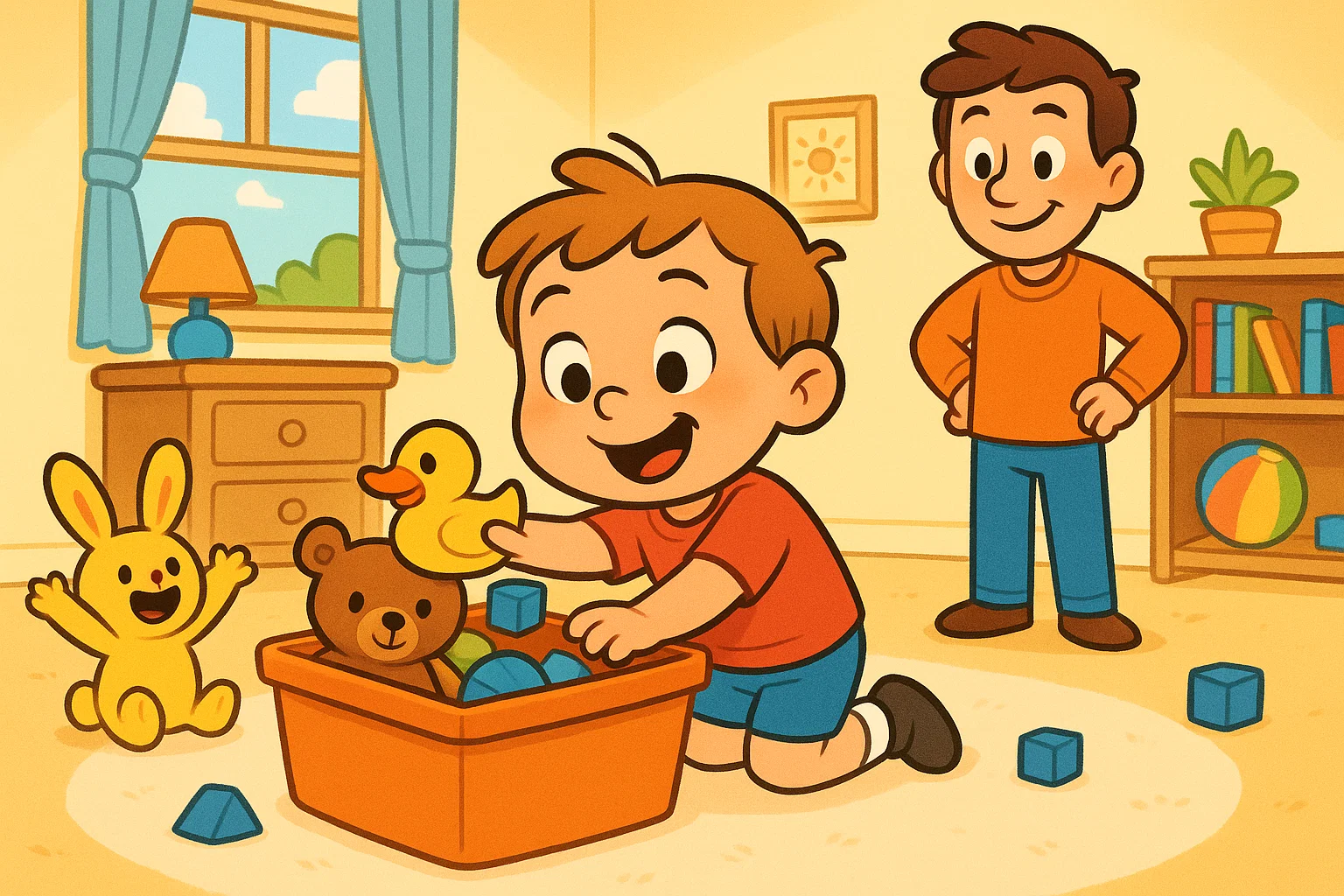At age 3, children are naturally curious, eager to help, and ready to take on age-appropriate chores around the house. This developmental stage presents a perfect opportunity to introduce household chores that make your little one feel important while building essential life skills early. Below is a comprehensive guide to selecting suitable chores for kids, motivating your child with effective tips, and transforming everyday activities into fun and educational experiences for the whole family.
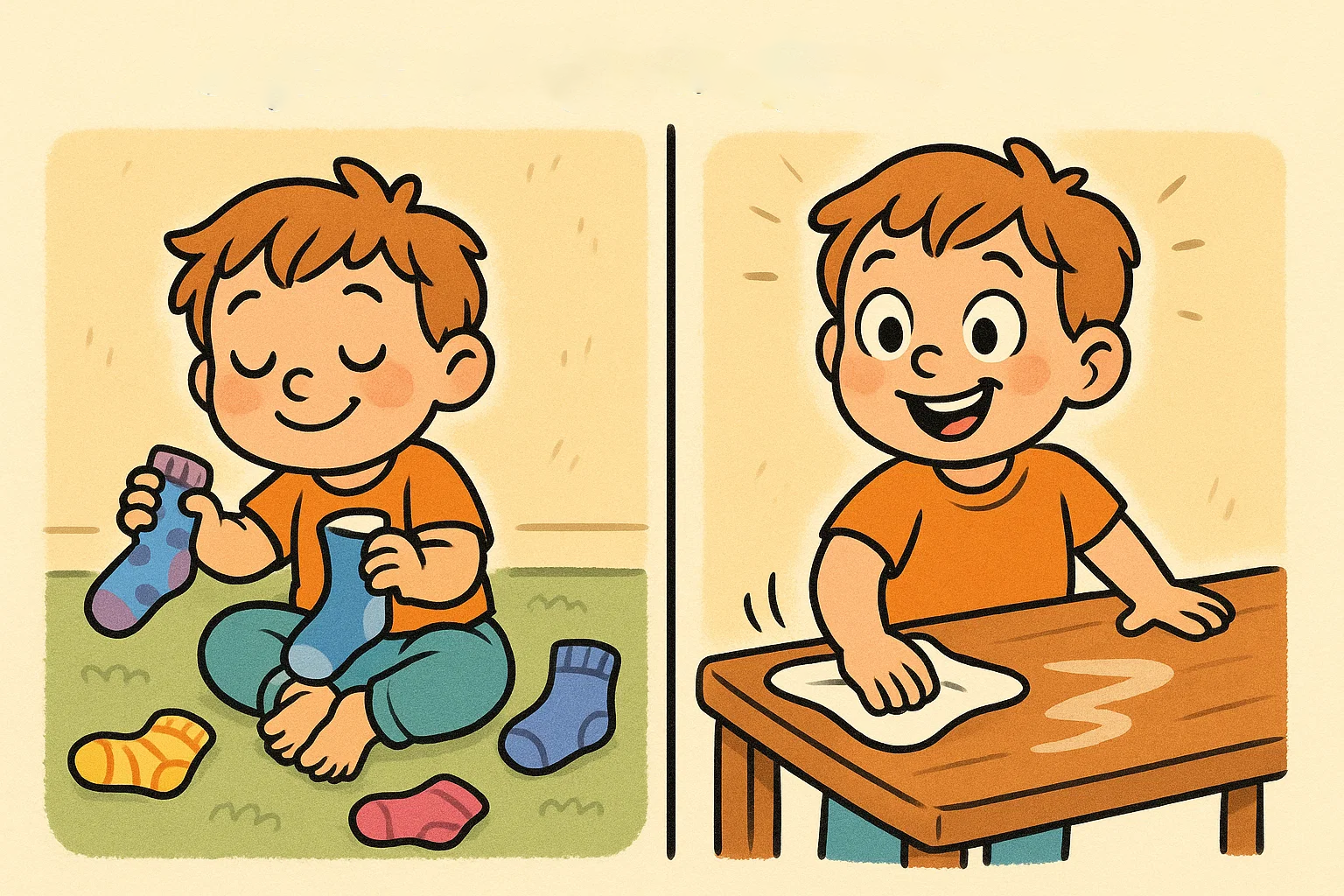
Why Chores for a 3-Year-Old Matter: The Hidden Benefits 💪
Introducing chores for children may seem premature, but child development experts agree that it’s never too early to start building a sense of responsibility. When implementing age-appropriate chores for children, particularly 3-year-olds, they experience significant emotional, cognitive, and behavioral benefits that extend far beyond simply completing housework.
Studies indicate that children who regularly engage in age-appropriate chores show improved self-regulation skills and better academic performance later in life. Here’s what chores help kids develop:
Essential Skills Built Through Age-Appropriate Daily Tasks
- Motor Skills Development – Activities like putting away toys, wiping surfaces, and organizing belongings engage fine motor coordination and hand-eye coordination
- Problem-Solving Abilities – Children learn to sequence activities and figure out efficient ways to complete simple jobs
- Listening Skills – Following multi-step instructions improves dramatically as children learn to cooperate with family members
- Classification Skills – Sorting items by color or matching socks practice pattern recognition
Building Confidence Through Simple Chore List Activities
Three-year-olds thrive on feeling capable and valued. When they complete age-appropriate activities, they experience ga enuine sense of accomplishment that builds self-esteem more effectively than empty praise. This helps get kids motivated to want to help around the house and take on additional responsibilities as they grow.
Children who contribute to daily chores develop a stronger sense of responsibility and learn to cooperate. They begin to understand that every family member has important roles and that their contributions matter. This approach helps teach children valuable life skills from an early age.
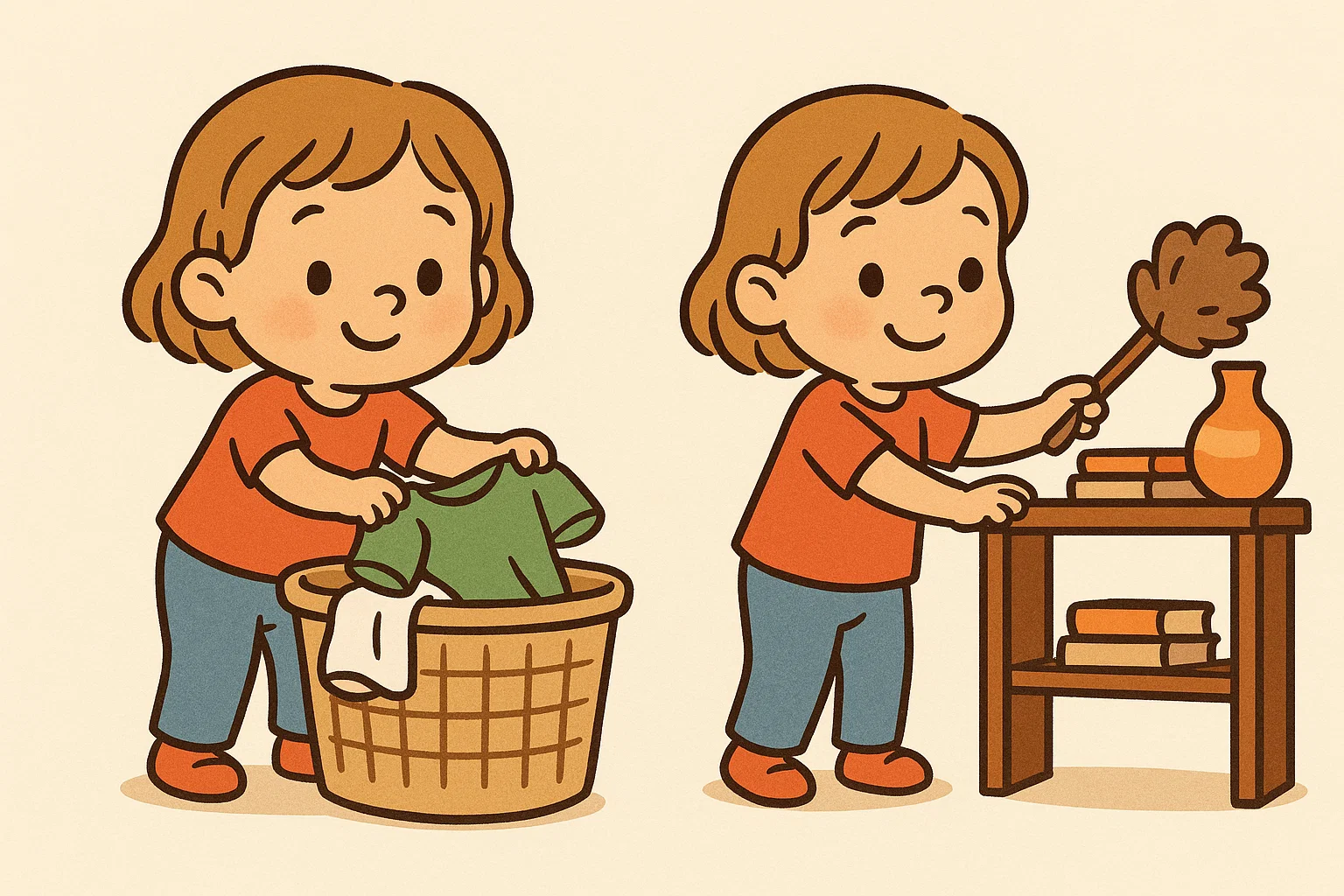
Chores for a 3-Year-Old: What Your Child Can Do ✨
Selecting appropriate chores for a 3-year-old requires understanding their developmental capabilities and attention span. At this age, children can follow simple, one-step instructions and work for approximately 5-10 minutes on a single activity. The key is choosing simple tasks that match their abilities while still feeling meaningful.
Household Activities That Build Independence
Here’s a practical list of chores that work well for younger kids:
- Toy clean-up – Put away toys serves as an excellent starting point for learning organization
- Dusting low surfaces – Using a microfiber cloth allows children to help with maintenance while developing motor skills
- Wiping up spills – Teaches immediate accountability for accidents
- Organizing stuffed animals – Helps children practice categorization and caring behaviors
- Simple vacuum preparation – Let children help by picking up items before you vacuum
Tip: Make cleaning up toys more engaging by singing cleanup songs or setting a timer for a “toy rescue mission.”
Parenting insight: At this age, showing patience and celebrating small wins helps children develop positive associations with helping around the house.
Kitchen Helper Tasks for Little Ones
Kitchen chores offer excellent opportunities for 3-year-olds to contribute meaningfully to family meals:
- Setting napkins at each place setting
- Sorting plastic utensils with supervision
- Putting away groceries in low cabinets
- Helping load the dishwasher with plastic items
- Simple dish-related jobs like sorting clean plastic dishes
These age-appropriate activities teach counting, pattern recognition, and the importance of preparation, while children need supervision for safety.
Simple Laundry Tasks That Teach Life Skills
Basic laundry-related chores help instill responsibility while developing practical skills:
- Matching socks – Provides an excellent introduction to clothing care while developing visual discrimination
- Placing dirty clothes in the hamper – Teaches organization and cleanliness routines
- Folding washcloths – Develops fine motor skills and patience
- Sorting laundry – Help separate items before washing
Personal Hygiene Tasks for Independence
Daily hygiene routines help children learn self-care:
- Brush their teeth with supervision
- Put dirty clothes in the hamper before bath time
- Hang up towels after use
- Organize personal items in the bathroom
- Make their beds with help (pulling covers up)
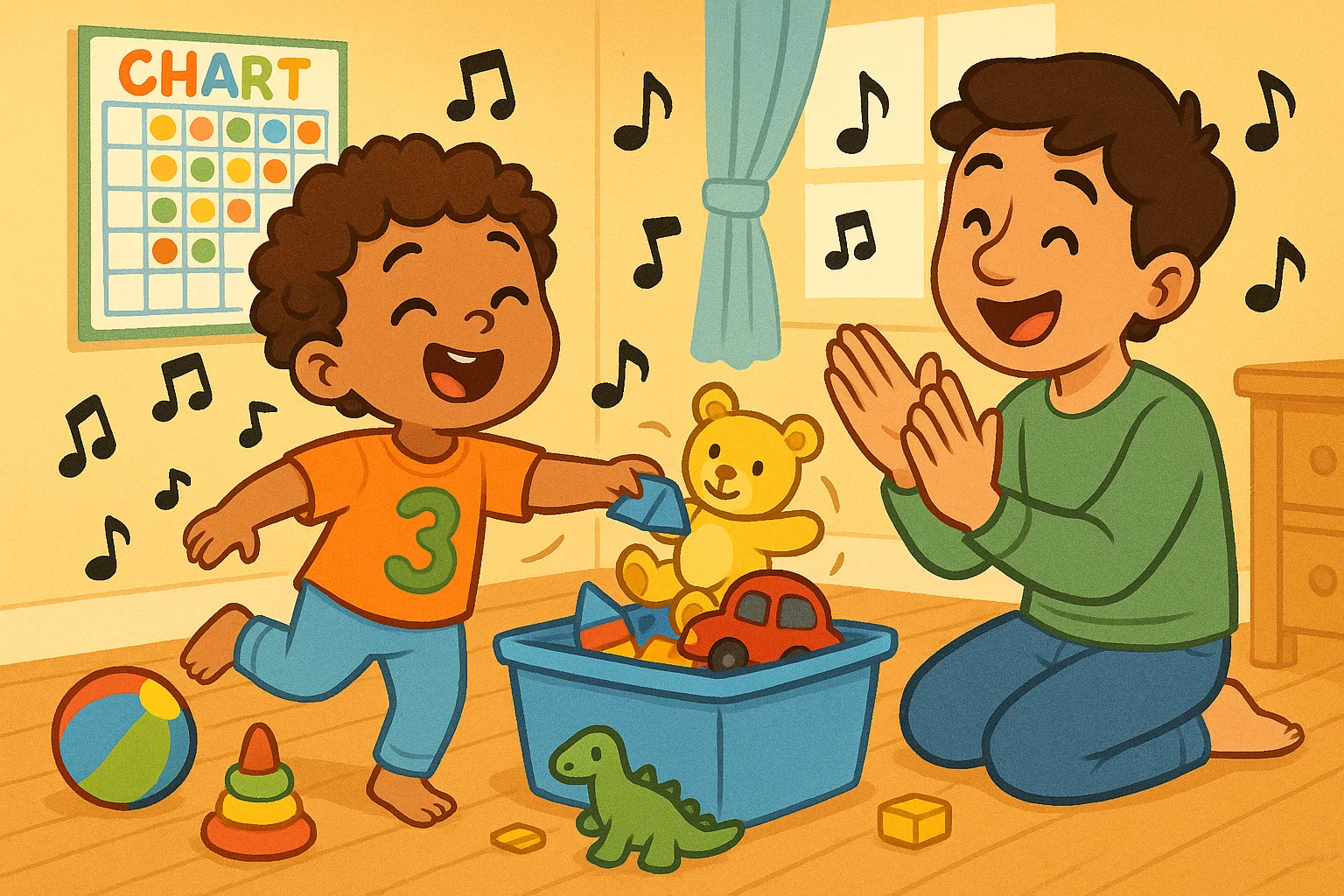
Getting 3 Year Old Excited About Chores: Proven Tips 🎯
Motivating 3-year-olds requires understanding their developmental needs and natural inclinations. Here are proven strategies for getting kids excited about contributing to family life through age-appropriate activities.
The Power of Praise and Positive Recognition
Effective praise focuses on effort rather than perfection. Instead of saying “good job,” try specific comments that show your child exactly what they did well. This approach to teaching your child responsibility while maintaining their enthusiasm works best when combined with consistent routines.
Weekly chore chart ideas:
- Use a printable chore chart with pictures for non-readers
- Add stickers for completed age-appropriate activities
- Create visual reminders of daily expectations
- Let your child help design their own chart
- Include a weekly chore review to celebrate achievements
Make Chores Fun: Transform Simple Tasks Into Engaging Games
Music makes almost any activity more enjoyable for 3-year-olds. Create specific songs for different activities or use timer games to add excitement. Here are ways to make it fun:
- Cleanup races – “Can you put all toys before dinner in their bins before this song ends?”
- Imaginative play – Dirty clothes become “sleepy clothes” that need to go to bed in the hamper
- Sorting games – Make matching socks into a puzzle activity
- Helper roles – Let children be “kitchen assistants” or “cleaning helpers”
Setting Realistic Expectations for Success
Understanding that preschoolers are still developing helps parents maintain realistic expectations. Their version of “clean” may not match adult standards, and that’s perfectly acceptable. Show your child the correct way rather than criticizing mistakes when they cooperate with activities.
Daily Chore Chart for 3-Year-Old: Timing and Frequency ⏰
Most 3-year-olds can successfully manage 2-4 simple activities per day, depending on their temperament. These age-appropriate activities should be spread throughout the day rather than concentrated in a single session.
How Many Chores Per Day Work Best
Here’s a practical chore list structure for daily success:
| Time of Day | Ideal Age-Appropriate Tasks | Duration |
| Morning | Put away toys, help make their beds | 5-10 minutes |
| Afternoon | Help with laundry, wipe surfaces | 10-15 minutes |
| Evening | Clear dishes, clean your room basics | 5-10 minutes |
Best Times for Child Cooperation
Morning hours often provide the best opportunity for activity completion, as children typically have higher energy levels after a good night’s sleep. After meals presents another excellent opportunity, as the activities feel naturally connected to the activity they’ve just completed.
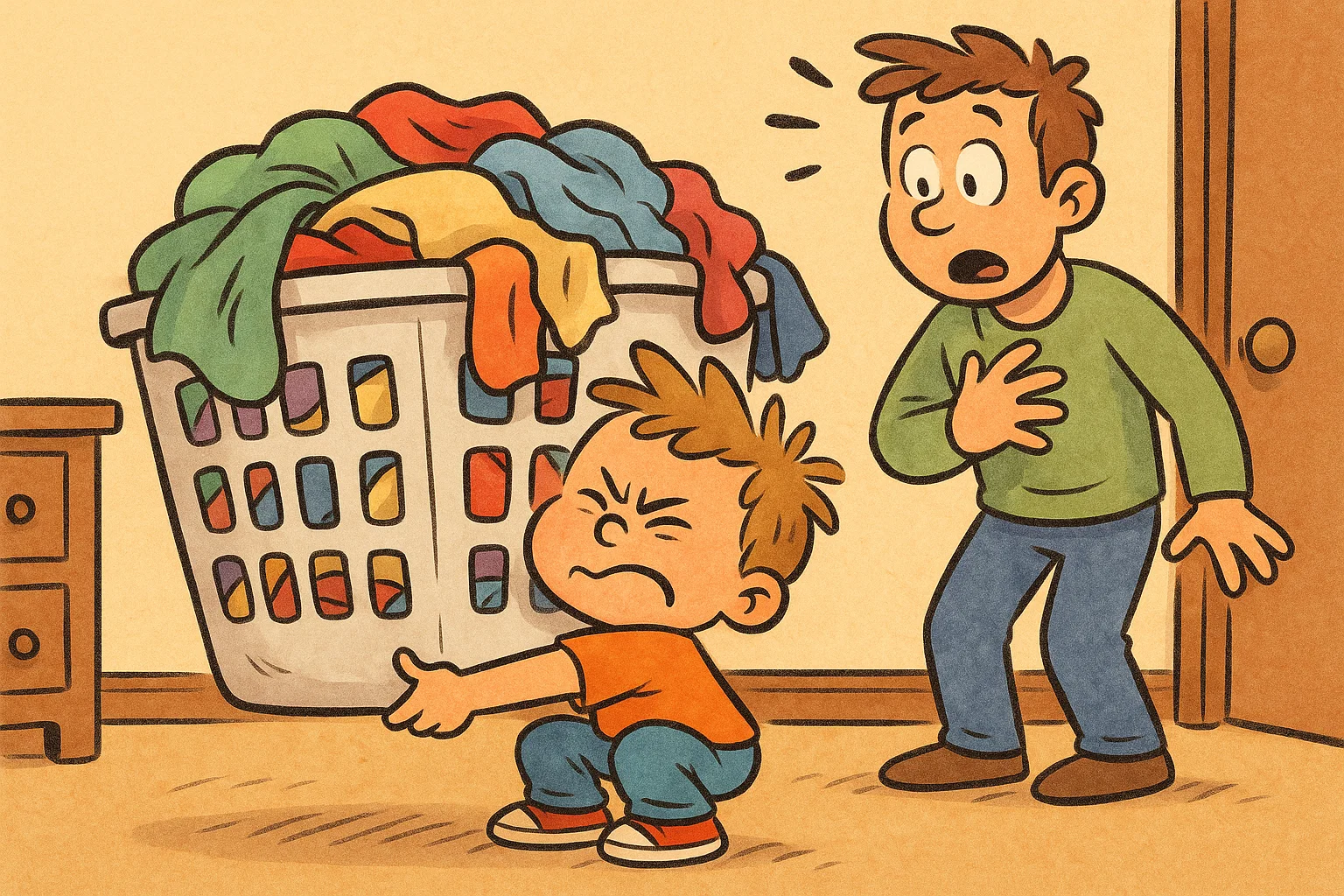
Common Mistakes with 3-Year-Old Chores to Avoid ⚠️
Even well-intentioned parents can create negative associations with chores by making common mistakes. Understanding these pitfalls helps families establish positive, sustainable routines when they assign age-appropriate activities.
Giving Tasks Beyond Their Developmental Stage
One common mistake involves giving 3-year-olds activities that require skills they haven’t yet developed. Children at this age need simple, concrete activities with clear outcomes. Remember that older kids can handle more complex assignments, but being able to do these things at age 3 means focusing on the basics.
Inconsistent Expectations and Routines
Consistency provides the foundation for successful activity patterns. When activities are enforced sporadically, children become confused about expectations and may develop resistance to participating.
Building Lifelong Habits: Your Journey to Teach Children Responsibility Starts Now 🚀
Introducing chores to toddlers represents an investment in their future development and family harmony. The foundation you build with simple, age-appropriate activities will expand naturally as your child grows and you assign more complex activities.
Key takeaways for successful implementation:
- Start with 2-4 simple daily activities
- Use visual aids like printable chore charts
- Focus on effort over perfection
- Maintain consistency in expectations
- Celebrate small victories enthusiastically
Remember that every child develops at their own pace. The key is maintaining patience, celebrating small achievements, and focusing on the process rather than perfection. Your 3-year-old’s eager participation in age-appropriate activities represents the beginning of a lifelong journey toward independence and responsibility.


